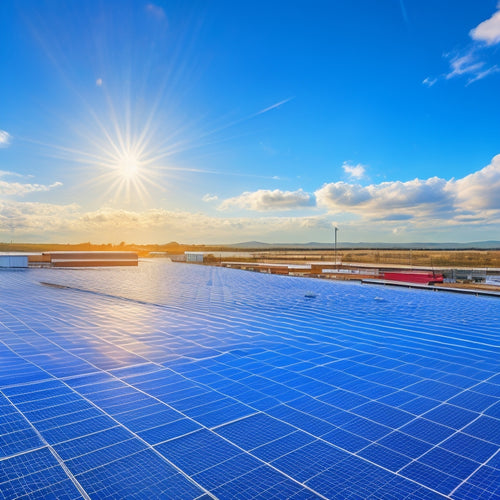
5 Best Solar Panel Kits for Home Independence
Share
You're looking for a top-performing solar panel kit that can provide reliable energy independence for your home, and with numerous options available, making the right choice is essential. Top-rated solar panel kits from brands like Renogy, HQST, and WindyNation offer high efficiency and durability. Consider portable kits for camping or RVing, or opt for off-grid solutions with energy storage evaluations. When selecting a kit, prioritize high wattage output, thorough warranties, and compatibility with local building codes and roof structures. As you investigate your options, remember that the right fit depends on your unique energy requirements and installation needs, so be prepared to learn more about the features that matter most.
Overview
- For home independence, choose top-rated solar panel kits from brands like Renogy, HQST, and WindyNation for high efficiency and durability.
- Portable solar panel kits, such as Renogy 400W Kit, provide energy capture without roof installation and are ideal for camping, RVing, and backup power.
- Assess energy storage options, like Lead-Acid, Lithium-Ion, and Deep Cycle batteries, to ensure a steady power supply during low sunlight.
- Ensure compatibility with local building codes and roof structure, and consider high-efficiency panels with optimized inverters for maximum energy output.
- Regular maintenance is crucial to optimize solar panel energy output, including proper wiring, connectivity, and battery type selection.
Top-Rated Solar Panel Kits
When shopping for a solar panel kit, a top-rated system is vital to guarantee you're getting the most out of your investment.
You'll want to evaluate reputable solar panel brands, such as Renogy, HQST, and WindyNation, which offer high-efficiency panels and reliable performance.
Additionally, it's essential to verify that your chosen kit is compatible with local building codes and that your roof is structurally sound to support the panels Residential Solar Panel Bundles.
Installation costs can vary depending on the complexity of the installation and the location, but on average, you can expect to pay between $2.50 and $3.50 per watt.
A top-rated solar panel kit won't only provide you with clean energy but also increase your energy independence.
Look for kits with a high wattage output, durable components, and a thorough warranty to confirm your system lasts for years to come.
Portable Power for Homeowners
You're not limited to installing solar panels on your roof; portable solar panel kits offer homeowners an alternative way to capture the sun's energy.
These kits allow you to utilize the sun's power wherever you need it, whether it's for camping, RVing, or simply providing backup power during outages.
With high-efficiency monocrystalline panels like Renogy 400W Kit, you can generate power efficiently, even in outdoor settings.
Portable solar panel kits typically include a solar panel, charge controller, and battery storage, which can be easily transported and set up.
With energy management systems, you can monitor and control your energy usage, ensuring you have power when you need it.
Solar Energy for Off-Grid Living
Off the grid, solar energy is an important component of self-sufficiency, allowing individuals to employ the sun's power to generate electricity for their homes, cabins, or remote dwellings. You can take advantage of the solar power benefits by installing a reliable solar panel kit. However, it's vital to evaluate energy storage to guarantee a steady power supply during nighttime or periods of low sunlight.
| Energy Storage Option | Capacity | Cycle Life |
|---|---|---|
| Lead-Acid Battery | 200-400Ah | 200-300 cycles |
| Lithium-Ion Battery | 100-200Ah | 300-500 cycles |
| Deep Cycle Battery | 400-600Ah | 400-600 cycles |
When choosing an energy storage solution, assess factors like capacity, cycle life, and compatibility with your solar panel kit. This will make certain you have a reliable and efficient off-grid solar energy system.
DIY Solar Installation Made Easy
Your DIY solar installation expedition begins with a well-planned and executed setup.
You'll need to assess your energy requirements, choose the right solar panel kit, and guarantee a suitable roof or ground mounting system. A key aspect of DIY solar installation is proper wiring and connectivity to guarantee efficient energy harvesting, bearing in mind factors like load calculation, peak sun hours, and panel efficiency sizing considerations.
It's also essential to reflect on the type of batteries you'll need, as battery type selection impacts maintenance, cost, and performance. Don't forget to think about energy storage options, such as batteries, to store excess energy for later use.
Regular solar panel maintenance is vital to optimize energy output, so be prepared to clean and inspect your panels regularly.
With the right tools and knowledge, you'll be generating your own clean energy in no time.
High-Efficiency Solar Solutions
What makes a solar panel kit high-efficiency? It's all about maximizing energy output while minimizing space and upfront costs.
You want a system that utilizes the latest solar technology advancements to generate more power per hour of sunlight. Look for kits with high-efficiency solar panels (>20% efficient) and inverters that optimize energy harvesting.
A high-efficiency kit should also include advanced energy storage systems, like lithium-ion batteries, to store excess energy for later use. This guarantees you have a reliable power supply even on cloudy days or during grid outages.
Frequently Asked Questions
Can I Install Solar Panels on a Metal or Tile Roof?
You'll need to take into account specific installation considerations for your metal or tile roof, as they require unique mounting systems and may have weight or waterproofing constraints that affect the solar panel installation process.
Will Solar Panels Work During a Power Outage?
When darkness falls, you're left in the dark, literally, without a backup plan. But, you'll be relieved to know that solar panels can work during a power outage, thanks to grid connection and energy storage, allowing you to shine bright like a guiding light in the night.
How Often Should I Clean My Solar Panels?
You'll want to prioritize solar panel maintenance by cleaning them every 6-12 months, depending on your location and climate, to guarantee ideal energy output and prolong their lifespan.
Are Solar Panels Resistant to Extreme Weather Conditions?
You'll be glad to know that, yes, solar panels are designed to withstand extreme weather conditions, boasting impressive durability and weather resistance, so you can enjoy uninterrupted energy generation even in harsh climates, come rain or shine.
Can I Expand My Solar Panel Kit in the Future?
You can expand your solar panel kit in the future by ensuring kit compatibility, choosing a scalable system, and planning for solar panel expansion, allowing you to increase energy independence as your needs grow.
Ready to Buy
As you stand in your backyard, surrounded by the quiet hum of independence, you gaze up at the rooftop solar panel kit that's utilizing the sun's energy to power your home. The panels' sleek design blends seamlessly into the scenery, a proof of your commitment to sustainable living. With each passing day, you're one step closer to breaking free from the grid, your energy bills dwindling like the morning dew on a summer morning. Your path to home independence is paved with sunshine.
Related Posts
-

Smart Home Thermostats to Revolutionize Your Space
Smart home thermostats revolutionize your space by providing precise temperature control and optimizing energy saving...
-

Renewable Energy Solutions to Reduce Your Carbon Footprint
To reduce your carbon footprint, adopting renewable energy solutions is key. Using solar panels or wind turbines can ...
-

Commercial Solar Energy
As you consider powering your business with commercial solar energy, you'll uncover it offers a triple benefit: signi...


